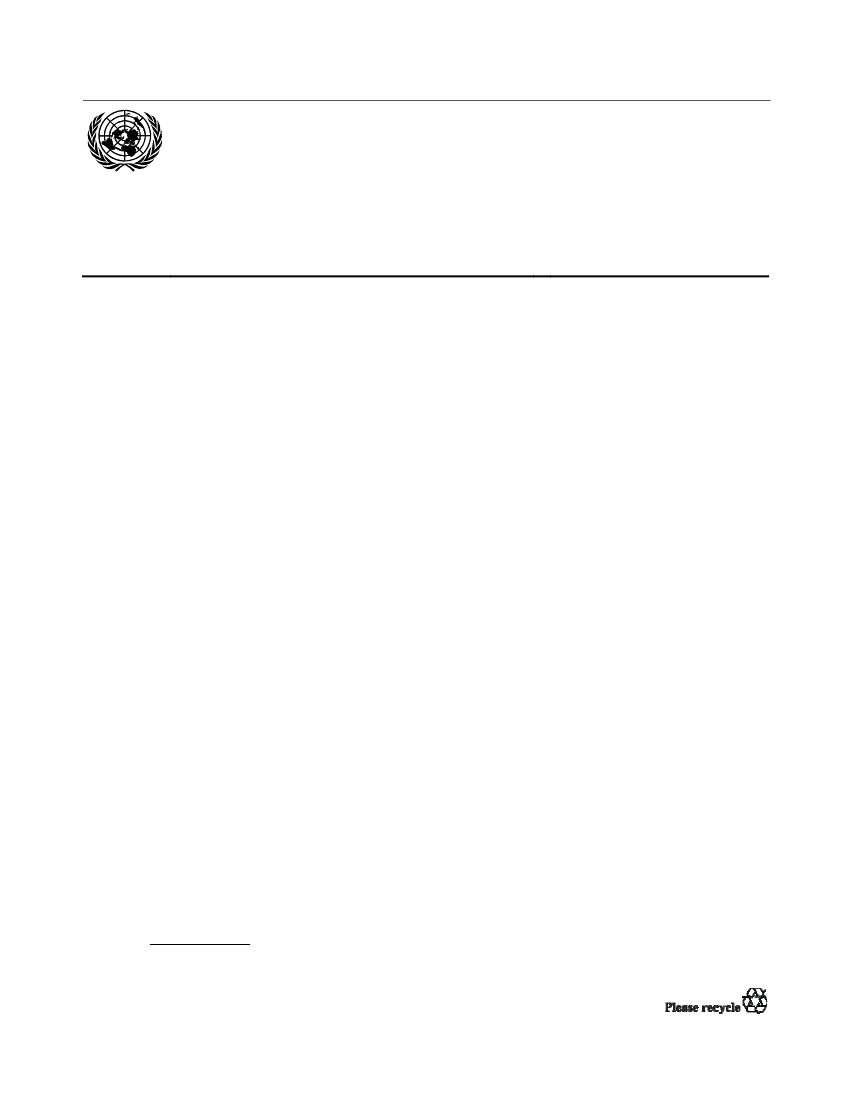Udenrigsudvalget 2009-10
URU Alm.del Bilag 65
Offentligt
United Nations
S/RES/1894 (2009)*Distr.: General11 November 2009
Security Council
Resolution 1894 (2009)Adopted by the Security Council at its 6216th meeting, on11 November 2009The Security Council,Reaffirmingits commitment to the continuing and full implementation, in amutually-reinforcing manner, of resolutions 1265 (1999), 1296 (2000), 1325 (2000),1612 (2005), 1674 (2006), 1738 (2006), 1820 (2008), 1882 (2009), 1888 (2009) and1889 (2009), and all relevant statements of its President,Reaffirmingits commitment to the Purposes of the Charter of the UnitedNations as set out in Article 1 (1-4) of the Charter, and to the Principles of theCharter as set out in Article 2 (1-7) of the Charter, including its commitment to theprinciples of the political independence, sovereign equality and territorial integrityof all States, and respect for the sovereignty of all States,Notingconsiderationas a thematicand Memberconflict,that this year marks the tenth anniversary of the progressiveby the Security Council of the protection of civilians in armed conflictissue; andacknowledgingthe enduring need for the Security CouncilStates to strengthen further the protection of civilians in armed
Noting furtherthat this year also marks the 60th anniversary of the GenevaConventions of 1949, which together with their Additional Protocols constitute thebasis for the legal framework for the protection of civilians in armed conflict,Recognizingthat States bear the primary responsibility to respect and ensurethe human rights of their citizens, as well as all individuals within their territory asprovided for by relevant international law,Reaffirmingthat parties to armed conflict bear the primary responsibility totake all feasible steps to ensure the protection of civilians,Reaffirmingthe relevant provisions of the 2005 World Summit OutcomeDocument regarding the protection of civilians in armed conflict, includingparagraphs 138 and 139 thereof regarding the responsibility to protect populationsfrom genocide, war crimes, ethnic cleansing and crimes against humanity,Reiteratingits deep regret that civilians continue to account for the vastmajority of casualties in situations of armed conflict,* Reissued for technical reasons.
09-60245* (E)
*0960245*
Stressingthe particular impact that armed conflict has on women and children,including as refugees and internally displaced persons, as well as on other civilianswho may have specific vulnerabilities including persons with disabilities and olderpersons, andstressingthe protection and assistance needs of all affected civilianpopulations,Notingthe adoption of the African Union Convention for the Protection andAssistance of Internally Displaced Persons in Africa (2009),Noting with grave concernthe severity and prevalence of constraints onhumanitarian access, as well as the frequency and gravity of attacks againsthumanitarian personnel and objects and the significant implications of such attacksfor humanitarian operations,Recognizingthe need for States in or emerging from armed conflict to restoreor build accountable security institutions and independent national judicial systems,Recallingthe inclusion of war crimes, crimes against humanity and genocidein the statutes of the ad hoc international criminal tribunals and the Rome Statute ofthe International Criminal Court, andemphasizingin this regard the principle ofcomplementarity,Recognizingthe importance of reparations programmes in response to seriousviolations of international humanitarian law and gross human rights violations,Recognizingthe importance of empowering vulnerable civilians througheducation and training as a means to support efforts to halt and prevent abusescommitted against civilians in situations of armed conflict,Recognizingthe valuable contribution to the protection of children in armedconflict by the SRSG on Children and Armed Conflict and the Security CouncilWorking Group on Children and Armed Conflict, including its conclusions andrecommendations issued in line with resolution 1612 (2005), andrecallingresolution 1882 (2009), which aims to strengthen the protection of children insituations of armed conflict,Recallingits decision in resolution 1888 (2009) to address violence againstwomen and children in situations of armed conflict by requesting the Secretary-General to appoint a special representative and to identify and take the appropriatemeasures to deploy rapidly a team of experts to situations of particular concern withrespect to sexual violence in armed conflict,Notingthe practice of briefings to Security Council members by the Office forthe Coordination of Humanitarian Affairs on behalf of the United Nations’humanitarian community, both through formal and informal channels,Taking noteof the report of the Secretary-General on the protection ofcivilians of 29 May 2009 (S/2009/277) and its annex on constraints on humanitarianaccess, which identify the core challenges to the effective protection of civilians,namely enhancing compliance with international law; enhancing compliance bynon-State armed groups with their obligations under international law; enhancingprotection through more effective and better resourced United Nations peacekeepingand other relevant missions; enhancing humanitarian access; and enhancingaccountability for violations,
Welcomingthe proposals, conclusions and recommendations on the protectionof civilians included in the report of the Special Committee on PeacekeepingOperations and its Working Group (A/63/19) and the important work conducted bythe Security Council Working Group on Peacekeeping Operations, including itsefforts aimed at enhancing the implementation of protection mandates,Recallingthe statement of its President of 5 August 2009 (S/PRST/2009/24)andwelcomingongoing efforts to strengthen UN peacekeeping,Notingthat United Nations peacekeeping missions constitute one of severalmeans at the United Nations’ disposal to protect civilians in situations of armedconflict,Demandsthat parties to armed conflict comply strictly with the1.obligations applicable to them under international humanitarian, human rights andrefugee law, as well as to implement all relevant decisions of the Security Counciland in this regard,urgesthem to take all required measures to respect and protectthe civilian population and meet its basic needs;2.Reiteratesits condemnation in the strongest terms of attacks in situationsof armed conflict directed against civilians as such and other protected persons orobjects as well as indiscriminate or disproportionate attacks and the utilisation ofthe presence of civilians to render certain points, areas or military forces immunefrom military operations, as flagrant violations of international humanitarian lawand demands that all parties immediately put an end to such practices;Notesthat the deliberate targeting of civilians as such and other protected3.persons, and the commission of systematic, flagrant and widespread violations ofapplicable international humanitarian and human rights law in situations of armedconflict may constitute a threat to international peace and security, andreaffirms inthis regardits readiness to consider such situations and, where necessary, to adoptappropriate steps;4.Reiteratesits willingness to respond to situations of armed conflict wherecivilians are being targeted or humanitarian assistance to civilians is beingdeliberately obstructed, including through the consideration of appropriate measuresat the Security Council’s disposal in accordance with the Charter of the UnitedNations;Reiteratesits call on States that have not already done so to consider5.signing, ratifying or acceding to the relevant instruments of internationalhumanitarian, human rights and refugee law, and to take appropriate legislative,judicial and administrative measures to implement their obligations under theseinstruments;Demandsthat all States and parties to armed conflict fully implement all6.relevant decisions of the Security Council and in this regard cooperate fully withUnited Nations peacekeeping missions and Country Teams in the follow-up andimplementation of these resolutions;7.Calls uponall parties concerned,
(a) to ensure the widest possible dissemination of information aboutinternational humanitarian, human rights and refugee law;
(b) to provide training for public officials, members of armed forces andarmed groups, personnel associated to armed forces, civilian police and lawenforcement personnel, and members of the judicial and legal professions; and toraise awareness among civil society and the civilian population on relevantinternational humanitarian, human rights and refugee law, as well as on theprotection, special needs and human rights of women and children in conflictsituations, to achieve full and effective compliance;(c) to ensure that orders and instructions issued to armed forces and otherrelevant actors are in compliance with applicable international law, and that they areobserved, inter alia, by establishing effective disciplinary procedures, central towhich must be the strict adherence to the principle of command responsibility tosupport compliance with international humanitarian law;(d) to seek, where appropriate, support from United Nations peacekeepingand other relevant missions, as well as United Nations Country Teams and theInternational Committee of the Red Cross and, where appropriate, other members ofthe International Red Cross and Red Crescent Movement, on training and awarenessraising on international humanitarian, human rights and refugee law;Emphasizesthe importance of addressing in its country specific8.deliberations the compliance of parties to armed conflict with internationalhumanitarian, human rights and refugee law;notesthe range of existing methodsused, on a case by case basis, for gathering information on alleged violations ofapplicable international law relating to the protection of civilians andunderlinestheimportance in this regard of receiving information that is timely, objective, accurateand reliable;Considersthe possibility, to this end, of using the International Fact-9.Finding Commission established by Article 90 of the First Additional Protocol to theGeneva Conventions;10.Affirmsits strong opposition to impunity for serious violations ofinternational humanitarian law and human rights law andemphasizesin this contextthe responsibility of States to comply with their relevant obligations to end impunityand to thoroughly investigate and prosecute persons responsible for war crimes,genocide, crimes against humanity or other serious violations of internationalhumanitarian law in order to prevent violations, avoid their recurrence and seeksustainable peace, justice, truth and reconciliation;11.Recallsthat accountability for such serious crimes must be ensured bytaking measures at the national level, and by enhancing international cooperation insupport of national mechanisms,draws attentionto the full range of justice andreconciliation mechanisms to be considered, including national, international and“mixed” criminal courts and tribunals, and truth and reconciliation commissions, aswell as national reparation programs for victims and institutional reforms; andunderlinesthe Security Council’s role in ending impunity;12.Reaffirmsthe Security Council’s role in promoting an environment that isconducive to the facilitation of humanitarian access to those in need;13.Stressesthe importance for all, within the framework of humanitarianassistance, of upholding and respecting the humanitarian principles of humanity,neutrality, impartiality and independence;
14.Stressesthe importance for all parties to armed conflict to cooperate withhumanitarian personnel in order to allow and facilitate access to civilian populationsaffected by armed conflict;15.Expressesits intention to:
(a) Call on parties to armed conflict to comply with the obligationsapplicable to them under international humanitarian law to take all required steps toprotect civilians and to facilitate the rapid and unimpeded passage of reliefconsignments, equipment and personnel,(b) Mandate UN peacekeeping and other relevant missions, whereappropriate, to assist in creating conditions conducive to safe, timely and unimpededhumanitarian assistance,16.Further expressesits intention to:
(a) Consistently condemn and call for the immediate cessation of all acts ofviolence and other forms of intimidation deliberately directed against humanitarianpersonnel,(b) Call on parties to armed conflict to comply with the obligationsapplicable to them under international humanitarian law to respect and protecthumanitarian personnel and consignments used for humanitarian relief operations,(c) Take appropriate steps in response to deliberate attacks againsthumanitarian personnel;17.Invitesthe Secretary-General to continue the systematic monitoring andanalysis of constraints on humanitarian access, to include as appropriateobservations and recommendations in his briefings and country-specific reports tothe Council;18.Recallsits determination to upgrade the strategic oversight ofpeacekeeping operations mindful of the important role peacekeeping operations playfor the protection of civilians andreaffirmsits support to the efforts made by theSecretary-General to review peacekeeping operations and to provide enhancedplanning and support andrenewsits encouragement to deepen these efforts, inpartnership with troop and police contributing countries and other relevantstakeholders;19.Reaffirmsits practice of ensuring that mandates of UN peacekeeping andother relevant missions include, where appropriate and on a case-by-case basis,provisions regarding the protection of civilians,stressesthat mandated protectionactivities must be given priority in decisions about the use of available capacity andresources, including information and intelligence resources, in the implementationof mandates; andrecognizes,that the protection of civilians when and as mandatedrequires a coordinated response from all relevant mission components;20.Reaffirms alsothe importance of entrusting peacekeeping and otherrelevant missions that are tasked with the protection of civilians with clear, credibleand achievable mandates, based on accurate and reliable information on thesituation on the ground, and a realistic assessment of threats against civilians andmissions, made in consultation with all relevant stakeholders, andfurther reaffirmsthe importance of a greater awareness in the Security Council of the resource and
field support implications of its decisions andstressesthe necessity to ensure theexecution of the afore-mentioned mandates to protect civilians in the field;21.Recognizesthe necessity to take into account the protection needs ofcivilians in situations of armed conflict, in particular women and children, in theearly phase of mandate drafting and throughout the lifecycle of United Nationspeacekeeping and other relevant missions and in this regardunderlinestheimportance of engagement with the countries concerned and of close consultationwith the Secretariat, troop and police contributing countries, and other relevantactors;22.Recognizes alsothe need for comprehensive operational guidance onpeacekeeping missions’ tasks and responsibilities in the implementation ofprotection of civilians mandates andrequeststhe Secretary-General to develop inclose consultation with Member States including troop and police contributingcountries and other relevant actors, an operational concept for the protection ofcivilians, and to report back on progress made;23.Requeststhe Secretary-General, in consultation with relevant actors, toensure that peacekeeping missions with protection of civilians’ mandates, in keepingwith the strategic plans that guide their deployment, conduct mission-wide planning,pre-deployment training, and senior leadership training on the protection of civiliansand requests troop and police contributing countries to ensure the provision ofappropriate training of their personnel participating in UN peacekeeping and otherrelevant missions to heighten the awareness and responsiveness to protectionconcerns, including training on HIV/AIDS and zero tolerance of sexual exploitationand abuse in UN peacekeeping missions;24.Requeststhe Secretary-General to ensure that all relevant peacekeepingmissions with protection mandates incorporate comprehensive protection strategiesinto the overall mission implementation plans and contingency plans which includeassessments of potential threats and options for crisis response and risk mitigationand establish priorities, actions and clear roles and responsibilities under theleadership and coordination of the SRSG, with the full involvement of all relevantactors and in consultation with United Nations Country teams;25.Requeststhe Secretary-General to ensure that United Nations missionsprovide local communities with adequate information with regard to the role of themission and in this regard ensure coordination between a United Nations missionand relevant humanitarian agencies;26.Takes noteof practical measures taken by ongoing peacekeepingmissions and United Nations Country Teams to enhance the protection of civiliansin the field, andrequeststhe Secretary-General to include best practice in his nextreport on protection of civilians to the Council;27.Reaffirmsits practice of requiring benchmarks, as and where appropriate,to measure and review progress made in the implementation of peacekeepingmandates andstressesthe importance of including indicators of progress regardingthe protection of civilians in such benchmarks for relevant missions;28.Emphasizesthe need for a comprehensive approach to facilitate theimplementation of protection mandates through promoting economic growth, goodgovernance, democracy, the rule of law, and respect for, and protection of human
rights, and in this regard,urgesthe cooperation of Member States andunderlinestheimportance of a coherent, comprehensive and coordinated approach by the principalorgans of the United Nations, cooperating with one another and within theirrespective mandates;29.Notesthat the excessive accumulation and destabilizing effect of smallarms and light weapons pose a considerable impediment to the provision ofhumanitarian assistance and have a potential to exacerbate and prolong conflicts,endanger civilians and undermine security and the confidence required for a returnto peace and stability,calls onparties to armed conflict to take all feasibleprecautions to protect the civilian population, including children, from the effects oflandmines and other explosive remnants of war, and in this regard,encouragestheinternational community to support country efforts in clearing landmines and otherexplosive remnants of war and to provide assistance for the care, rehabilitation andeconomic and social reintegration of victims, including persons with disabilities;30.Reiteratesthe importance of the Aide Memoire on the protection ofcivilians (S/PRST/2009/1) as a practical tool that provides a basis for improvedanalysis and diagnosis of key protection issues, particularly during deliberations onpeacekeeping mandates andstressesthe need to implement the approaches set outtherein on a more regular and consistent basis, taking into account the particularcircumstances of each conflict situation;31.Recognizesthe important role of the Secretary-General in providingtimely information to the Security Council on protection of civilians in armedconflict in particular through thematic and country specific reports and throughbriefings;32.Requeststhe Secretary-General to include in his reports to the Council oncountry-specific situations more comprehensive and detailed information relating tothe protection of civilians in armed conflict, including on protection-relatedincidents and actions taken by parties to armed conflict to implement theirobligations to respect and protect the civilian population, including informationspecific to the protection needs of refugees, internally displaced persons, women,children and other vulnerable groups;33.Requeststhe Secretary-General to develop guidance for UNpeacekeeping and other relevant missions on the reporting on the protection ofcivilians in armed conflict with a view to streamlining reporting and enhancing theCouncil’s monitoring and oversight of the implementation of protection mandates ofUN peacekeeping and other missions;34.Stressesthe importance of consultation and cooperation between theUnited Nations, the International Committee of the Red Cross and other relevantorganisations including regional organisations to improve the protection of civiliansin armed conflict;35.Requeststhe Secretary-General to submit his next report on theprotection of civilians in armed conflict by November 2010;36.Decidesto remain seized of the matter.







